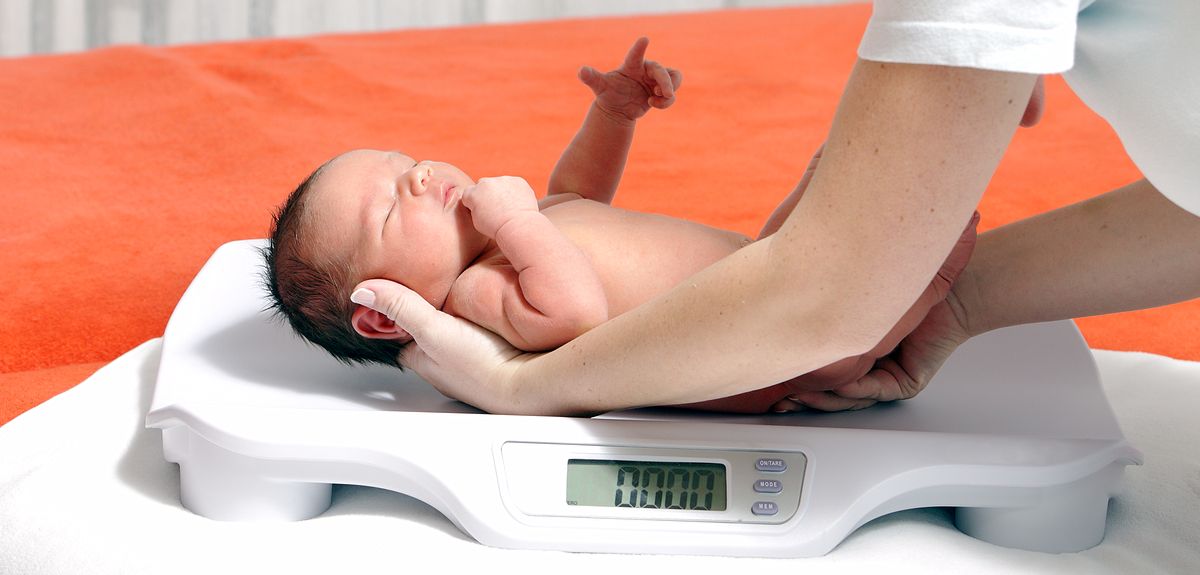
Image credit: Shutterstock
Predicting diabetes risk from birth(weight)
In a guest post for Science Blog, Dr Emma O'Brien, Public Engagement and Communications Officer in the Radcliffe Department of Medicine at Oxford, writes about a new study looking at how a baby's birthweight can be used to predict its future health.
Do you know how much you weighed when you were born? From that first weigh-in moments after birth, it's possible to predict your future adult health. And when it comes to disease risk in later life, it's best to be average – babies that are larger than average are at an increased risk of diabetes, while small babies are at a higher risk of both diabetes and heart disease. The reasons for this are complex, but researchers at the University of Oxford have perhaps found the biggest part of the puzzle. It's in your genes.
In a global study involving 160 researchers and 150,000 DNA samples, scientists have found that some of the variation between babies' birthweights can be traced back to DNA differences in 60 regions of the genome. For any given antenatal ward, genetic variations between babies account for about one in six of the variations in birthweight – that's about the same impact on growth as maternal smoking or obesity.
But these genetic differences don't just contribute to birth weight. There is significant overlap between the DNA variations that combine to influence growth in the womb and the pattern of genetic differences that conspire to increase the risk of diabetes, high blood pressure and heart disease in adult life. The team, led by Professor Mark McCarthy at Oxford's Wellcome Trust Centre for Human Genetics and Dr Rachel Freathy at the University of Exeter, showed that these genetic factors were acting through a series of shared processes, including those linked to metabolism, to influence growth in the womb and disease risk in adulthood.
Until now, the link between birthweight and disease risk was explained, at least in part, by the 'fetal origins hypothesis'. This theory suggests that the relationships between early growth and later disease result from the long-term effects of exposing an individual to too little or too much nutrition in the womb. These early challenges are thought to trigger a series of changes in the 'set-up' of the metabolic profile of the body, which increase disease risk in adulthood. However, this latest genetic study suggests that the link between birthweight and disease in adult life is triggered at conception.
Professor McCarthy says: 'These genetic findings provide vital clues to the processes that link growth in the womb and risk of diabetes and heart disease as an adult. Take, for instance, variations in genes that lead to reduced insulin levels in the body. Insulin is an important hormone controlling growth in early life, so low levels can hamper development in the womb. Years later, the very same genetic variations mean the body doesn't have enough insulin to deal with the sugar we eat, leading to diabetes. It's going to be really important that we delve into all these processes in the hunt for prevention and treatment strategies.'
The picture gets more complex when we consider the impact of the mother's genes on her baby's growth – after all, they share 50% of their DNA, and it's the mother's genes that dictate the gestational environment. Could a baby's risk of disease in adulthood actually be driven by the shared maternal genes exerting influence on conditions in the womb? 'It's a bit of both,' says Professor McCarthy. 'While both mother and baby's genes play a role in influencing birthweight and subsequent disease risk, it's the child's genes that have the biggest impact.'
Diabetes and heart disease are major public health challenges, and at the heart of this research is the desire to better understand the mechanisms underlying their development. This is basic research, but it's fundamental to developing improved strategies for the prevention and treatment of these conditions. Will this research impact clinical care? If the foetal origins hypothesis were the complete picture, then we'd expect improvements in antenatal care and reduction in cases of intrauterine deprivation to help alleviate the rising prevalence of diabetes and related conditions. But this latest genetic study indicates that, however desirable antenatal care improvements are in their own right for mother and baby, they may only have a modest impact on health in later life. We will need to find other ways to prevent the seemingly unstoppable rise in these conditions.